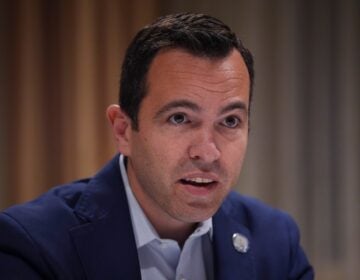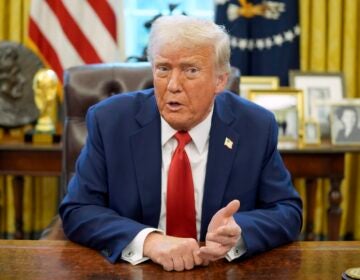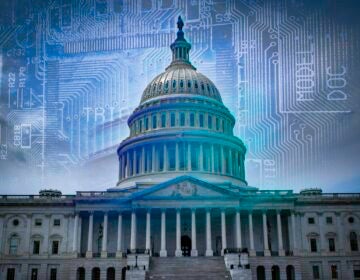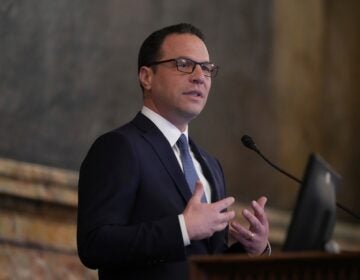What happens if Trump starts ignoring court rulings? We break it down
A court finding that the Trump administration didn't comply with an earlier order and a statement by Vice President Vance have some experts warning of a constitutional crisis.
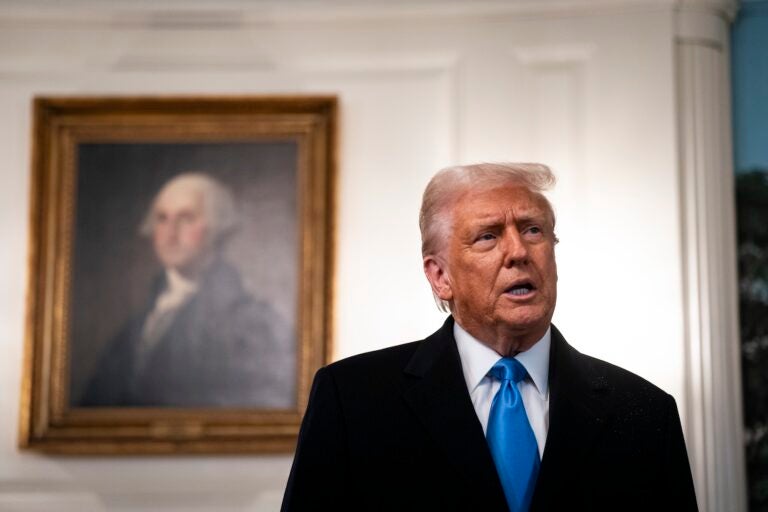
A court found that President Trump's administration had not complied with an earlier court order. Experts worry about the potential of a constitutional crisis. (Al Drago/Getty Images)
This story originally appeared on NPR.
In less than a month in office, President Trump has signed dozens of executive orders that are now facing pushback in the courts.
Many are wondering: What happens if he simply ignores them?
Law professors who spoke to NPR saw warning signs of a constitutional crisis based on a recent court order and comments from the vice president over the weekend.
On Monday, a federal judge in Rhode Island found the White House had defied an earlier court order to unfreeze federal grant and program funds. U.S. District Judge John McConnell Jr. ordered the administration to immediately end any federal funding pause.
That court order came a day after Vice President JD Vance suggested that judges don’t have the ability to challenge President Trump’s “legitimate power.”
Vance wrote on X, “If a judge tried to tell a general how to conduct a military operation, that would be illegal. If a judge tried to command the attorney general in how to use her discretion as a prosecutor, that’s also illegal. Judges aren’t allowed to control the executive’s legitimate power.”
It’s unclear what specific judge or court order Vance was referring to.
Federal judges like McConnell have the power to levy fines and find parties in contempt for not following his orders. But that’s generally considered toothless enforcement, according to experts.
Trump has been openly critical of the courts, over the weekend calling a judge’s order against Elon Musk’s Department of Government Efficiency team “a disgrace.”
But on Tuesday, Trump said he would comply with court rulings against DOGE. “I always abide by the courts. Always abide by them, and we’ll appeal,” he said.
Law experts say it hasn’t reached a full-blown crisis quite yet
Kristin Hickman, a professor of administrative law at the University of Minnesota Law School, urges caution on talk of a constitutional crisis.
The Trump administration is still entrenched in legal fights in the lower courts and, so far, has not defied any orders from the U.S. Supreme Court, the nation’s highest court, she noted.
“We’re not there yet and we have no guarantee we’re ever going to get there. It is not healthy for our body politic for us to overreact and roll around a lot of overheated rhetoric,” she said.
Blake Emerson, a professor of law and political science at UCLA, perceives a tangible threat from Vance’s social media post that seems to indicate the U.S. is threatening to enter a new dangerous stage.
“We’re now seeing a leap to a new level, potentially, where the president claims authority to act outside the bounds of the law established by Congress,” he said. “And if that comes to pass, we really will be in a different form of constitutional government, or maybe one that really shouldn’t be described as constitutional in the true sense. And here, I do think risks about tyranny or dictatorship become quite real.”
Speaking to All Things Considered on Tuesday, University of Virginia law professor Amanda Frost said she was “deeply concerned, as I think every American should be, about the way in which executive power is being abused, misused and overstepping the bounds of the authority,” referencing actions such as the Trump executive order to end birthright citizenship.
“But I will say that as of today, at this moment, the executive branch has not taken the position that it can violate court orders or that it does not need to comply with court orders,” she said.
How the system is supposed to work
One of the central roles of the federal courts in the U.S. is to review the executive branch’s implementation of federal law or its failure to implement federal law, said Emerson.
“There are statutes that give the courts the power to do that,” he said.
Traditionally, executive branch employees, officials and lawyers have understood they must comply, not just with explicit court orders, but with existing legal roles to comply with the rule of law. But that’s mostly relying on good faith and tradition, Emerson said.
Within this system, there are avenues for the Trump administration to challenge court decisions. The White House can, and has in prior administrations, appealed to appellate courts and the Supreme Court over lower court decisions it disagrees with.
That phase of the litigation hasn’t been reached for Trump’s cases, Emerson said. But the Trump administration’s reaction to court orders so far, including Vance’s statement, suggest that there’s at least some discussion within the Oval Office over the extent the administration plans to challenge judicial authority, he said.
What courts have at their disposal
Courts have tools to force compliance — whether that be through fines or sanctions, finding someone in contempt or even jail time.
But some experts, like retired federal judge Nancy Gertner, who spoke to Morning Edition, view these options as representing empty threats.
“It’s not clear that fines are going to make a particle of difference. There’s even the possibility of imprisoning someone until the order is followed,” she said.
It would fall to the U.S. Marshals Service — which is part of the Department of Justice — to enforce a judge’s order. But “if Trump wanted to fully not comply, he could direct the Department of Justice not to comply. At that point, you have a full-on constitutional crisis,” Gertner said.
A 2018 Harvard Law Review article on judicial contempt powers by Yale University professor Nicholas R. Parrillo found there were several cases of federal judges who tried to levy fines and imprisonment when the executive branch was found noncompliant with court orders. But he concluded that higher courts “have exhibited a virtually complete unwillingness to allow sanctions, at times swooping down at the eleventh hour to rescue an agency from incurring a budget-straining fine or its top official from being thrown in jail.”
However, Parrillo wrote, “even though contempt findings are practically devoid of sanctions, they have a shaming effect that gives them substantial if imperfect deterrent power.”
A look back in history
Hickman, with the University of Minnesota Law School, believes courts don’t typically pursue fines or sanctions, saying that “usually it is enough to threaten them and people tend to comply.”
Still, there have been times presidents have ignored Supreme Court decisions, rendering them essentially unenforceable.
In 1832, the Supreme Court overturned the conviction of a missionary living with the Cherokee Nation for refusing to take an oath to obey the laws of Georgia. Chief Justice John Marshall found that the Cherokee Nation constituted an independent political community and didn’t have to follow Georgia’s laws. President Andrew Jackson ignored that ruling on the Cherokee’s independence and launched the forced migration of the Cherokee Nation known as the Trail of Tears.
Almost 30 years later, President Abraham Lincoln authorized the suspension of the writ of habeas corpus during the Civil War. Chief Justice Roger Taney declared that in doing this, Lincoln had exercised a power that belonged only to Congress. Lincoln disagreed. It was essentially resolved about two years later when Congress authorized the president to suspend habeas corpus.
Courts ultimately have few ways to punish a president for ignoring their rulings, but Congress still exists to intervene, Hickman said.
“Congress, ultimately, is the arm of our government that enacts statutes. And if the president is claiming authority under a statute to do X and Congress disagrees, Congress can amend the statute and say, you don’t have the power,” she said.
However, Republicans, faithful to Trump, control both the House and Senate, so opposition is unlikely.
WHYY is your source for fact-based, in-depth journalism and information. As a nonprofit organization, we rely on financial support from readers like you. Please give today.


